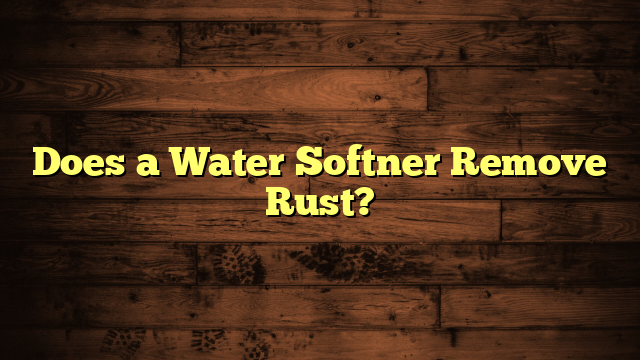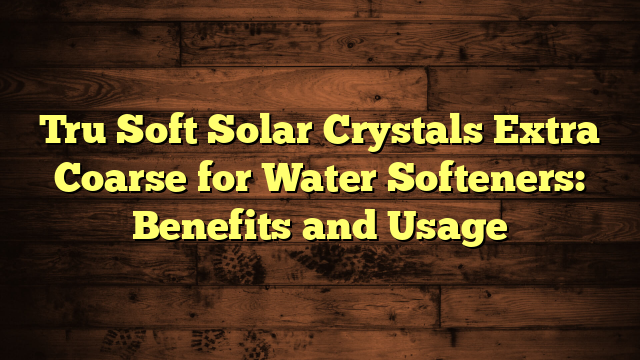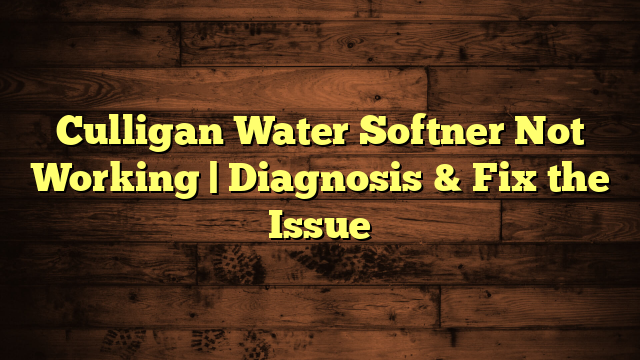Does a Water Softner Remove Rust?
You might wonder if a water softener can tackle rust issues in your water supply. While these systems are great for handling hardness minerals like calcium and magnesium, they aren't designed to remove rust. This leaves you with a critical question: if a water softener isn't the solution, what options do you have for addressing rust and ensuring the quality of your water? Understanding the true capabilities of water softeners can lead to better choices for your home.
Key Takeaways
- Water softeners primarily target hardness-causing minerals like calcium and magnesium, not iron or rust.
- Rust in water typically originates from corroded pipes or high iron levels, unrelated to water hardness.
- Iron oxidation can still occur even with softened water, leading to rust stains.
- Additional filtration systems, such as iron filters, are necessary for effective rust removal.
- Regular water quality testing helps identify rust issues and informs appropriate treatment solutions.
Understanding Water Softeners
When it comes to tackling hard water issues, many homeowners turn to water softeners. You might be dealing with water hardness, which can lead to a range of problems, from scale buildup in pipes to dull laundry.
Understanding the different softener types available can help you find the right solution for your home.
The most common types of water softeners are ion-exchange systems and salt-free alternatives. Ion-exchange softeners work by replacing hard minerals like calcium and magnesium with sodium ions, effectively reducing water hardness.
On the other hand, salt-free systems use a process called template-assisted crystallization, which alters the structure of hard minerals, preventing them from sticking to surfaces.
Choosing the right water softener depends on your specific needs, including your household size, water usage, and budget.
Make sure to test your water hardness before making a decision. This will give you a clearer idea of the level of treatment required.
Causes of Rust in Water
When you notice rust in your water, it often comes from corroded pipes or high iron levels in groundwater sources.
Old, deteriorating plumbing can leach iron into your water supply, while certain geographical areas naturally contain more iron than others.
Understanding these causes helps you take steps to mitigate rust and protect your water quality.
Corroded Pipes Contribution
Corroded pipes can greatly contribute to the rust you find in your water supply. As your pipes age, they undergo pipe deterioration, leading to corrosion that can release iron particles into your water. This corrosion often stems from factors like moisture, chemical reactions, and the type of metal used in your plumbing.
If you've noticed reddish-brown stains on your fixtures or a metallic taste in your water, it's a sign that rust is likely present.
To mitigate these issues, corrosion prevention becomes essential. Regular inspections can help identify weak points in your plumbing system before they worsen. If you catch corrosion early, you can often repair or replace affected areas, stopping rust from spreading through your water supply.
Furthermore, consider using corrosion-resistant materials during any plumbing upgrades, as these can greatly extend the life of your pipes.
Iron in Groundwater Sources
Many homeowners may not realize that iron in groundwater sources can be a significant cause of rust in their water supply. When groundwater becomes contaminated with iron, it can lead to unsightly stains on fixtures and laundry. This issue often arises from natural deposits in the ground or from industrial activities that introduce iron into the water supply.
Here are some factors contributing to iron in groundwater:
- Natural deposits: Iron-rich minerals can leach into groundwater from surrounding rocks and soil.
- Agricultural runoff: Fertilizers and pesticides may contain iron, leading to contamination.
- Industrial discharge: Some industries release iron-laden wastewater, affecting nearby groundwater sources.
Once iron is present in your water, it can undergo iron oxidation, which transforms dissolved iron into solid particles. These particles can then precipitate out, leading to rust and discoloration.
To address groundwater contamination, homeowners may need to evaluate water treatment options, such as filtration or water softeners, to effectively manage the iron levels in their supply. Knowing the source of your water's rust can help you take the necessary steps to guarantee clean, rust-free water in your home.
How Water Softeners Work
The effectiveness of water softeners hinges on their ability to remove minerals that cause hardness, primarily calcium and magnesium.
These minerals can create scale buildup in your pipes and appliances, leading to inefficiency and potential damage. The softening process relies on a method called water ion exchange.
In this process, hard water enters the softener and flows through a resin tank filled with small beads.
These beads are coated with sodium ions. As hard water passes through, the calcium and magnesium ions attach to the resin beads, displacing the sodium ions. This exchange removes the hardness from the water, effectively softening it.
Once the resin beads become saturated with calcium and magnesium, they need to be regenerated.
This is done by flushing the beads with a saltwater solution, which replenishes the sodium ions and prepares the beads for another cycle of softening.
Can Softeners Remove Rust?
Water softeners primarily focus on removing calcium and magnesium, but they aren't designed to tackle rust. While they improve water quality by reducing hardness, they fall short in rust removal.
If you're dealing with rust in your water supply, you'll need a different approach.
Consider these points regarding softener efficiency and rust:
- Type of Contaminants: Softeners target minerals, not iron or rust.
- Additional Systems: To effectively address rust, you might need a dedicated filtration system.
- Water Quality Testing: Regular testing can help you understand what's in your water and guide your treatment choices.
If rust is a concern, look into iron filters or whole-house filtration systems that specifically address iron and rust.
These systems can work alongside your softener, enhancing your overall water quality.
Remember, a water softener can't improve the appearance or safety of rust-laden water.
So, if you want clean, rust-free water, it's essential to seek out the right solutions tailored to your needs.
Don't settle for less; verify your water isn't only soft but also clear of rust.
Limitations of Water Softeners
While water softeners excel at removing calcium and magnesium, they aren't always effective against iron or rust.
If your water supply has high levels of iron, you might need additional treatment options to tackle those rust issues.
Understanding these limitations can help you choose the right system for your home.
Iron vs. Calcium Removal
Many homeowners rely on water softeners to tackle hard water issues, but these systems primarily target calcium and magnesium ions, leaving iron-related problems largely unaddressed.
Unfortunately, while water softeners effectively reduce calcium buildup, they won't greatly handle iron oxidation. This can lead to rust stains and other concerns in your plumbing and appliances.
Here are a few key points to keep in mind:
- Iron Oxidation: When iron is present in water, it can oxidize, leading to rust. Water softeners don't stop this process.
- Calcium Buildup: Softened water reduces calcium buildup in pipes and fixtures, preventing clogs and extending the life of your appliances.
- Limited Effectiveness: If you have considerable iron in your water, a water softener alone won't solve the issue; you might need additional treatment options.
Treatment for Rust Issues
Addressing rust issues in your home requires more than just a water softener.
While water softeners excel at reducing calcium and magnesium levels, they don't effectively tackle rust. If you're facing rust stains in your plumbing or on fixtures, you'll need a thorough rust treatment strategy.
First, consider using rust removal products specifically designed for this purpose. These products can effectively dissolve existing rust stains and prevent further buildup.
You might also want to look into water filters that specifically target iron and rust in your water supply.
In addition to chemical solutions, regular maintenance can help mitigate rust issues. Flushing your plumbing system periodically will reduce the accumulation of rust and other deposits.
If the problem persists, consulting a professional plumber can provide insight into more permanent solutions, such as replacing old pipes or installing a dedicated rust removal system.
Alternatives to Water Softeners
If you're looking to tackle hard water issues without a traditional water softener, several effective alternatives can help. One popular option is salt-free systems, which condition water without removing essential minerals. These systems work by altering the structure of minerals, preventing them from causing scale buildup.
Another alternative involves various filtration methods. These can range from simple sediment filters to advanced reverse osmosis systems, which remove impurities, including some minerals. While they may not soften water in the traditional sense, they can improve overall water quality and taste.
Consider the following alternatives:
- Salt-Free Systems: Great for those looking to avoid sodium while still conditioning water.
- Filtration Systems: Effective for reducing contaminants and improving taste, but may not specifically target hardness.
- Magnetic or Electronic Descalers: These devices claim to change mineral behavior in water, though their effectiveness can vary.
Each option has its pros and cons, so it's important to evaluate your specific needs and preferences.
With a bit of research, you can find the right solution to improve your water quality without the need for a conventional water softener.
Preventing Rust Stains
Hard water not only leads to scale buildup but can also contribute to rust stains on fixtures and appliances. To tackle this issue, you need a solid rust prevention strategy.
Start by inspecting your plumbing for leaks, as moisture can lead to rust formation. Fix any leaks promptly to avoid further damage.
Another effective method is to use rust-inhibiting products designed for your specific fixtures, such as faucets and showerheads. Regularly cleaning these surfaces with a gentle, non-abrasive cleaner can also help with stain removal.
Don't forget about your water heater; flushing it periodically can eliminate sediment buildup that causes rust.
Installing a water softener can greatly contribute to rust prevention by reducing the minerals in your water that promote corrosion. However, if you're not ready to invest in one, consider using a magnetic water conditioner or installing a whole-house filter.
Finally, consider using a rust-resistant paint or sealant on exposed metal surfaces, providing an additional layer of protection.
Evaluating Your Water Quality
Evaluating your water quality is essential for maintaining a healthy home and preventing issues like rust. You mightn't realize it, but the water flowing through your pipes could contain impurities that contribute to rust formation.
Conducting regular water testing and quality assessments can help you identify any problems early on, allowing you to take action before rust damages your fixtures or appliances.
Here are some key factors to take into account during your assessment:
- pH Levels: A balanced pH is vital; water that's too acidic or alkaline can corrode pipes.
- Mineral Content: High levels of iron can lead to rust stains and discoloration in your water.
- Hardness: While a water softener can help with hard water, it won't remove rust from your system.
Frequently Asked Questions
Can Water Softeners Improve the Taste of Water?
Yes, water softeners can improve the taste of water by enhancing mineral balance. They reduce hard minerals, which often cause a metallic or bitter taste, leading to a smoother and more enjoyable drinking experience.
How Often Should I Maintain My Water Softener?
You should maintain your water softener every six months. Regular softener cleaning guarantees peak performance and extends its lifespan. Keep track of maintenance frequency to enjoy consistently soft water and prevent potential issues.
Are There Health Risks From Softened Water?
Softened water's safety should spark your curiosity. While softened water health concerns exist, most people absorb minerals adequately. If you're on a sodium-restricted diet, consider consulting a healthcare professional for personalized guidance. Stay informed!
How Do I Know if My Softener Is Working Properly?
To check your softener performance, observe the water's feel and test its hardness. If you notice issues, follow troubleshooting tips like checking salt levels and inspecting the resin tank for clogs or leaks.
What Is the Cost of Installing a Water Softener?
When considering installation costs, you'll find water softener types vary greatly. Basic systems might start around $400, while advanced models can exceed $2,000. Factor in professional installation for accurate budgeting and ideal performance.
Conclusion
In conclusion, while water softeners excel at tackling hard minerals, they can't touch rust or iron in your water. Think of them as skilled gatekeepers for calcium and magnesium, but they leave rusty intruders unchecked. To effectively combat rust, you'll need additional filtration solutions tailored to iron removal. By understanding your water quality and utilizing the right systems, you can guarantee your water remains clean and free from those pesky rust stains.







